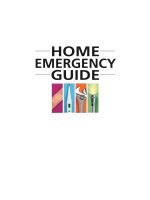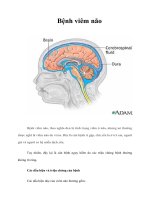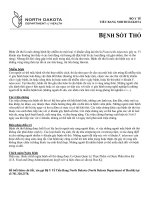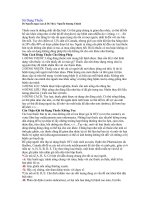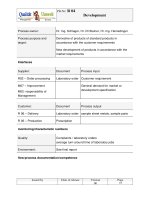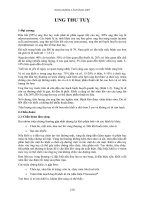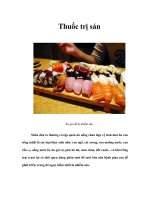Tài liệu Dimensions of Expertise docx
Bạn đang xem bản rút gọn của tài liệu. Xem và tải ngay bản đầy đủ của tài liệu tại đây (1.1 MB, 223 trang )
Dimensions of Expertise
Also available from Continuum
Philosophy of Education, Richard Pring
Vocational and Professional Capability, Gerard Lum
Perspectives of Quality in Adult Learning, Peter Boshier
Work Based Knowledge, Carol Costley and Pauline Armsby
Dimensions of Expertise
A Conceptual Exploration of Vocational
Knowledge
Christopher Winch
Continuum International Publishing Group
The Tower Building 80 Maiden Lane
11 York Road Suite 704
London SE1 7NX New York, NY 10038
www.continuumbooks.com
© Christopher Winch 2010
All rights reserved. No part of this publication may be reproduced or transmitted in any form
or by any means, electronic or mechanical, including photocopying, recording, or any
information storage or retrieval system, without prior permission in writing from the
publishers.
Christopher Winch has asserted his right under the Copyright, Designs and Patents Act, 1988,
to be identi ed as Author of this work.
British Library Cataloguing-in-Publication Data
A catalogue record for this book is available from the British Library.
ISBN: 9781847062680 (hardcover)
Library of Congress Cataloging-in-Publication Data
A catalog record for this book is available from the Library of Congress.
Typeset by Newgen Imaging Systems Pvt Ltd, Chennai, India
Printed and bound in Great Britain by the MPG Books Group
To all the members of my family.
This page intentionally left blank
Contents
Acknowledgements viii
Preface ix
1. The Two Faces of Expertise 1
2. Current Philosophical Debates about Knowing How 19
3. Skills and Their Discontents 39
4. Beyond Skill – the Complexities of Competence 58
5: To Follow a Rule . . . The Normative Basis of Practical Knowledge 78
6. Theory, Underpinning Knowledge and Practice 98
7. Tacit Knowledge 117
8. Can There be a Theory of Expertise? 135
9. Novice, Journeyman, Expert 154
10. Vocational Education and the Development of Expertise 177
Bibliography 197
Index 205
Acknowledgements
I have pro ted in the writing of this book from the thoughts and com-
ments of more people than can be mentioned here. I would, however, like
to express a special thanks for inspiration from Linda Clarke, Michaela
Brockmann, Paul Hager, Gerard Lum, Theodore Lewis, John Gingell,
Richard Pring, Ewart Keep, Lorraine Foreman-Peck, Leesa Wheelahan,
Geoff Hinchliffe, Mili, Rohit Dhankar, Padma Sarangapani, Dietrich
Benner, Ewart Keep, Geoff Hayward, Lorna Unwin and Michael Young.
Preface
A detailed philosophical debate on the nature of expertise has been long
overdue. This volume is a modest attempt to start that debate. The focus
is twofold. First, I attempt to explain and defend a particular account of
know-how, or practical knowledge, derived primarily but not exclusively
from the pioneering work of Gilbert Ryle. The book takes account of the
debate that Ryle’s work has engendered over the 64 years since he rst
published on this issue. Second, I try to relate this epistemological debate
to various discussions concerning the nature of expertise that have arisen
in vocational and professional education over the past 25 years, including
attempts to provide a theory of expertise.
This book argues against the possibility of a general theory of expertise
on the grounds that the activities to which the term ‘expertise’ is applied
are too diverse for a theory to be possible. This is not to say, however, that
there is nothing useful that can be said about expertise. One of my aims
has been to chart the various dimensions of expertise that might need to
be taken account of in trying to provide a description of expertise in any
particular area. In this sense, the book can be said to offer guidance to
those who wish to explore the character of expertise in the particular area
in which they work.
This page intentionally left blank
Chapter 1
The Two Faces of Expertise
Introduction
This book attempts two interrelated tasks. The rst is to arrive at an under-
standing of practical knowledge and how expertise is related to it. The
second is to show how such an understanding informs the various educa-
tional tasks of developing expertise. ‘Practical knowledge’ is understood
in a broad sense of ‘knowing how’ rather than ‘knowing that’, as set out
by Ryle
1
and includes consideration of the moral aspect of knowing how to
act, as well as what is known as practical judgement in the broader sense
of being able to act rationally in practical contexts and includes considera-
tion of ‘competence’, ‘skill’ and related terms. Declarative knowledge and
knowledge by acquaintance are not the main concern, although, as will
be seen, the relationships between these and practical knowledge will be
a continuing thread in the discussion, particularly declarative knowledge.
Indeed, in order to understand these relationships it will be necessary to
devote some attention to some important distinctions within these two
areas of knowledge, namely the distinction between organized knowledge
and singular knowledge on the one hand and between aspectual and non-
aspectual acquaintance on the other hand.
There are two related aspects to the concept of expertise. On the
one hand, an expert can be thought of as a subject expert, someone who
is extremely knowledgeable concerning an academic subject area. An
important feature of subject expertise is the ability to acquire fresh
knowledge within the subject, such as a scientist or scholar might accom-
plish. On the other hand, the concept of expertise is related to practical
activity such as carpentry, medicine, engineering, painting or shing,
which involves mastery of an occupation, profession or activity. We tend
to think of the rst kind of expertise as related to declarative or proposi-
tional knowledge and the second related to practical knowledge, ability
or skill. Although I shall be concerned primarily with the practical kind
2 Dimensions of Expertise
of expertise, one of the central arguments of this book is that there is
often an intimate relationship between the two and that they cannot
really be understood except in terms of each other. Thus, the kinds of
mastery involved in subject expertise involve practical knowledge, while
most kinds of practical expertise involve some, and sometimes a con-
siderable degree of, propositional knowledge. In order to understand
either kind of expertise, we need to be able to understand each kind of
knowledge and how each relates to the other, while not losing sight of
acquaintance knowledge.
There is a growing contemporary philosophical literature on the nature
of practical knowledge, which was largely restarted by Ryle and which
has come to life in recent years. Ryle’s celebrated distinction between
two kinds of knowledge, knowing how and knowing that has become hotly
contested, with some commentators arguing for an assim ilation of prac-
tical to propositional knowledge, while others have sought to distinguish
skill from practical knowledge. Others again have tried to defend Ryle’s
initial distinction. Work carried out by David Carr in the early 1980s
was taken up by Jason Stanley and Timothy Williamson in 2001 and the
debate has continued with contributions from Ian Rum tt, John Koethe,
Paul Snowdon and Tobias Rosefeldt among others. Although relevant
to the interest in skill and expertise in vocational education, the main-
stream philosophical debate has not so far touched on an issue that
was not treated in a satisfactory way by Ryle, namely the relationship
between practical and propositional knowledge in action and judge-
ment. However, it is a question not only of considerable epistemo logical
interest in its own right but also one of great relevance to our full under-
standing of expertise.
Chapter 2 will deal with the debate initiated by Ryle. It is, however, worth
re ecting on why the debate has educational signi cance; this will be the
main task of the current chapter. In its concerns with teaching and learn-
ing Philosophy of Education has, in the main, focused on the learning
of propositional knowledge in formal educational contexts. One must,
of course, be careful not to overstate this case. Aristotle’s work practical
knowledge and the development of the virtues and Rousseau and his suc-
cessors’ claim that learning takes place in practical ways, should give the
lie to the idea that Philosophy of Education is unconcerned with practical
knowledge or its acquisition in a variety of contexts. It is, however, arguable
that it has not received the detailed attention that it deserves in compar-
ison with the attention paid to the teaching and learning of propositional
The Two Faces of Expertise 3
knowledge. It is even more plausible to argue that the relationship between
the ways in which propositional and practical knowledge are related in
action has received comparatively little attention. Yet this is a matter of the
greatest interest to those who are concerned, as I am, with the development
of professional judgement, action and expertise.
What are the Issues?
Ryle argued that knowing how could not be subsumed to knowing that. The
latter should be considered as a distinct epistemic category. In Chapter 2,
his arguments will be considered. It is, however, worth noting that although
Ryle’s distinction is widely employed and recognized in everyday contexts,
his arguments for that distinction are by no means universally accepted.
In the main, those who reject them also reject Ryle’s claim that knowing
how is a distinct category from knowing that. For such commentators, any
instances of knowing how are, in fact, instances of knowing that. I will call
this Thesis 1.
What hangs on this dispute? Those who resist Ryle’s distinction claim, on
the whole, that knowing how is a species of knowing that. In other words
knowing that or propositional knowledge is a more basic epistemic cat-
egory than knowing how and that, despite some appearances to the con-
trary, in its fundamentals knowing how is a form of knowing that. If this
claim is true then one important proposition follows:
1. Anything that can intelligibly be said about a case of knowing that can
be intelligibly said about a case of knowing how.
What applies to a whole conceptual eld must also apply to its parts.
Of course, the converse does not follow, that what can be intelligibly said
about knowing how cannot necessarily be intelligibly said about knowing
that. If the critics of Ryle are correct, then nothing that can intelligibly said
about knowing that cannot be intelligibly said about knowing how. This
has the potential to pose problems for those who hold Thesis 1. It is rel-
evant to our understanding of practical knowledge in educational contexts
as well, since a faulty account of the relationship between knowing that and
knowing how threatens to pose dif culties for the development of useful
pedagogies and curricula in areas, such as vocational education, that are
engaged in the development of practical knowledge.
4 Dimensions of Expertise
On the face of it, 1 is problematic. To keep matters simple, let us use
examples of knowing that where a knower knows one proposition and of
knowing how where an agent knows how to do one action. Then
2. A knows that p
where p is a proposition, does not look like
3. A knows how to F
where F is an action.
It does not look as if
4. A knows how to p*
makes any sense, thus violating 1 above.
This is not, however, a fatal aw in Thesis 1 as it can be maintained that,
in order to lay bare the conceptual relationship between knowing how and
knowing that, one must do a little ‘unpacking’; a procedure not unknown
to Ryle himself. This can be done by showing that the best way to read
A knows how to F
is as
5. A knows that w is a way to F
Where w is a procedure, and if
w is a way to F
is abbreviated as p.
Then it can be shown that
A knows how to F
can be understood as
A knows that p
and 1 is not violated.
The Two Faces of Expertise 5
But another problem threatens. It makes sense to say something like
6. A knows how to F better than B does.
But not apparently
7. A knows that p better than B does.*
This is the Degree Problem that holders of Thesis 1 need to solve for their
preferred account of knowing how to work. The Degree Problem is that
one can have knowledge how in degrees, but not knowledge that, and if
this is so, then Thesis 1, that everything that can intelligibly be said about
knowing how can be said about knowing that, is violated.
As A. R. White points out, one can make sense of the above issue in
some interpretations, but although one can usually make sense of 6 in
terms of a single action, one cannot make sense of 7 in terms of a simple
proposition.
2
This means that the earlier construal of knowing how as
a species of knowing that through constructions like 5 will not work for
constructions like 6.
This is not to say that there are no solutions to such problems for hold-
ers of Thesis 1 and we will examine them in Chapter 2. At this point, how-
ever, I will suggest that the Degree Problem needs to be solved as it is based
on a fundamental feature of practical knowledge which is not present in
the same way in propositional knowledge. Practical knowledge is some-
thing that one can improve on by, for example, becoming more skilful at
a particular activity. It is possible to compare the abilities of more than
one individual. It is also possible to appraise an instance of practical know-
ledge by drawing attention to those features of it that merit admiration or
disapprobation. Ryle uses the term ‘intelligence epithets’ for these prima-
rily adverbially expressed intelligence concepts and maintains that they
apply to the actions to which they are ascribed, not to any mental acts that
may be supposed to accompany them.
3
Since vocational and professional
education are largely concerned with the development of practical knowl-
edge so that, in the course of time, novices progress to competence, on to
pro ciency and, nally, to expertise, our ability to intelligibly employ such
intelligence concepts in such normative activities as instructing, train-
ing, encouraging, explaining, demonstrating and assessing is essential to
the possibility of vocational education in this sense. Any epistemological
account of practical knowledge that fails to account for the possibility of
such practices must be fatally awed.
6 Dimensions of Expertise
In the meantime, however, it is necessary to look more closely at knowing
that. Although as has been argued, knowledge how is rightly considered to
be the special province of vocational and professional education, it would
be a grave mistake to think that knowledge that has no role to play in it. It
has, and the relationship between knowledge how and knowledge that in
vocational and professional education will be one of the central concerns
of this book.
One Face of Expertise: Subject Knowledge
A possible riposte to the Degree Problem would be to say that it is non-
existent. Just as it makes sense to say that A knows how to do F better than
B, so it makes sense to say that A knows how to do F well or badly, so it also
makes sense to say that A knows French History better than B, and one
can also, for example, know French History well or badly.
4
Indeed, to take
another example, it does not make sense to say that one knows how to spell
‘illiterate’ well or badly, one either knows how to or not.
5
This response
is incorrect and furthermore does not deal with the issue raised by Ryle,
since his formulation of the Degree Problem is not concerned primarily
with whether or not one can partly know that p, but with the application of
intelligence concepts, which cannot be done in the case of knowing that
when applied to single propositions. It is incorrect because it is not the case
that one can simply spell ‘illiterate’ without any evaluative quali cation.
6
Thus one can spell ‘illiterate’ neatly, quickly, accurately, and so on, but one
cannot apply an intelligence concept to
A knows that Napoleon went to Elba in 1815.
It is, of course, perfectly true that one can know French History well or
badly, and it is worth looking more closely at why this is the case. If French
History is taken to be the set of all relevant facts concerning that country’s
past, then it is clear that A could know French History better than B and it
is also clear that A could, for example, have a thorough or deep knowledge
of French History in this sense. A could simply know a lot of true proposi-
tions about France’s past or know more of them than B.
However, most historians would rightly complain that this was a super-
cial way of understanding the history of France and that, although a
good grasp of French History does indeed require the knowledge of many
facts about France’s past, it is by no means a suf cient condition for such
The Two Faces of Expertise 7
a grasp. We would require, as a minimum, that A would be able to make
sense of French History, by showing how events can be considered in terms
of reasons and causes, of responses and reactions organized in a coherent
narrative. And for this to be the case, A would need to know why events
occurred, not merely whether they did. In other words, he would need to be
able to offer explanations as well as facts. The cohering of A’s knowledge into
bodies of plausible, defensible and, possibly, compelling explanations of
sequences of events or of processes, is what would lead us to ascribe a good
grasp of a historical period to him. We might well want to use ‘intelligence
concepts’ in Ryle’s sense to characterize this grasp. For example, A might
show a subtle understanding of the personality of Napoleon or Ney, or be
able to discriminate between the motives of a Mirabeau or a Robespierre.
He might be able to incisively recount the factors that led to the Thermidor
counter-revolution or be able to weave together the complexities of the
interactions between domestic and foreign policies between 1793 and 1812
into a coherent narrative. Obviously all this knowledge would depend on
a range of abilities which would involve, although not be exhausted by his
knowledge of many relevant facts. In this sense, his good grasp of French
History will be informed by organizational and explanatory ability as well
as by raw propositional knowledge. The example, if anything tends against
those who try to dismiss the Degree Problem, because it shows how ability,
in the sense of knowing how, is a central ingredient of the grasp of a subject
like History, or indeed of many others.
However, we have not gone far enough either in characterizing what we
mean by subject knowledge nor what we mean by subject expertise. A’s
good grasp of French History described above might be expected of an
able upper secondary school student. Of a professional historian we would
expect far more, including the ability to evaluate historical claims and to
generate historical knowledge. It would also be reasonable to expect certain
virtues, not the least of which would be a love of the truth (Weil 1949,
pp. 53–7).
7
In order to understand this properly, we need to make a dis-
tinction between subjects as collections of facts and subjects as modes of acquir-
ing and maintaining knowledge. This distinction has been made, in various
forms by, for example, Michael Oakeshott with his ‘Modes of Experience’,
by Paul Hirst with his ‘Forms of Knowledge’ and by Philip Phenix with
his ‘Realms of Meaning’.
8
The basic idea of a form of knowledge (I will use
Hirst’s term) is that it is not merely a collection of facts but a historically
evolved and conceptually organized way of acquiring, testing and transmit-
ting knowledge. To avoid confusion, I will use the term ‘subject’ to talk of
8 Dimensions of Expertise
groupings of organized knowledge of this kind, while bearing in mind the
following provisos:
1. There is a uidity about subject boundaries which is, to an extent, pur-
pose relative.
2. Subject boundaries are not immutable.
3. Knowledge can be organized by drawing from the knowledge otherwise
located in already existent subjects.
A subject in this sense thus involves: central organizing concepts; central
facts; characteristic modes of inference which use the central organizing
concepts and central facts as the basis of inferential warrants within the
subject.
9
In addition, there are characteristic activities of investigation, dis-
covery, validation, inference and teaching which ensure that the subject
protects its relationship to the truth and augments and strengthens the
knowledge that it lays claim to. A subject in this sense is a form of life
organized around a set of concerns which have been so organized both
because they suit human purposes but also because they have been found
to constitute effective ways of organizing knowledge. Within such a form
of life the whole gamut of engagement can be found from the dabbler
and the dilettante, to the novice, to the expert and the devotee. Each of
these does not merely possess a store of knowledge to varying degrees but
has a range of abilities connected with the central activities that constitute
the core of a subject. In this sense, traditional subjects depend heavily on
human know-how as well as on extensive knowledge that.
As is well-known, such schemes for surveying the conceptual map of
subject knowledge classify the eld in different and sometimes mutually
inconsistent ways. In addition, it is arguable that some of them are incom-
plete. For example, Hirst’s Forms of Knowledge scheme admits and later
drops Religious Knowledge as a distinct epistemic category, while know-
ledge of foreign languages is not admitted into the scheme at all. For our
purposes, the precise details of such classi catory schemes do not matter
too much. It is arguable that different schemes are suitable for different
purposes and that one should not seek a template that is useful for all time
and all purposes. It does matter, however, that such schemes illuminate
in relation to what they are designed to illuminate, whether it be to give
an overview of the curriculum for a traditional English grammar school
education or to map the knowledge available for a range of vocational
programmes. It should be noted that Hirst’s Forms of Knowledge do not
correspond exactly either to traditional grammar school subjects or even
The Two Faces of Expertise 9
to newer ones. Thus the social sciences are put together as one form even
though it is quite plausible to suggest that Economics and Psychology are
methodologically distinct forms of enquiry, or, more radically, that differ-
ent assumptions underlie different approaches to the respective subject
matters of Economics and Psychology making them in effect more than
one form of knowledge, albeit concerned with the same subject matter.
To use a contemporary expression, the different subjects may each within
themselves embrace different paradigms, each with its own central concepts,
inferential warrants and modes of investigation and validation.
A central point about subjects (and by implication, the traditional sub-
jects of the grammar school curriculum) is that they organize both already
existing and new knowledge in a systematic way and imply procedures
for the discovery and validation of knowledge. One could say that such a
subject is a systematic way of organizing knowledge, bearing in mind that
this is a potentially misleading way of expressing the matter. At a min-
imum a subject will have the features already mentioned. One writer has
attempted to set out in more detail the kinds of inferences that are allowed
in each subject, preferring the term ‘forms of discussion’ for this aspect of
Hirstian Forms of Knowledge, which re ects the incomplete and dynamic
nature of the forms (Mackenzie 1998).
10
Another approach would be to
use Toulmin’s (1958) account of argumentative structures and show how
these vary in terms of backing statements and inferential warrants across
different areas of knowledge.
11
However, it is not enough to characterize
subjects in terms of inferential structures. There is a greater richness to the
systematic nature of such enquiry than distinctness of inference suggests
by itself.
There are usually core assumptions which, although rarely if ever articu-
lated, nevertheless constitute working assumptions in a particular eld of
enquiry, for example, that measuring instruments retain a certain con-
stancy in their results in various branches of the natural sciences or that
there really are genuine traces of the past as in Archaeology, Geology and
History. These are what Moyal-Sharrock has called ‘local riverbed proposi-
tions’, adapting Wittgenstein (1969).
12
There are very often also key pro-
positions with a normative or quasi-normative status, such as formulae of
Relativity Theory in Physics or Geometrical Axioms in Geometry, whose
status is unlikely to be questioned except in the most unusual circum-
stances. There are also central organizing concepts particular to subjects,
such as agency and narrative in History, or energy and eld in Physics. The
individual possession of concepts is itself a form of practical knowledge or
know-how, as will be argued in Chapter 2.
13
10 Dimensions of Expertise
It can be seen therefore that the systematic organization of knowledge
into subjects is something very different and much more subtle and com-
plex than the de nitions of knowledge to be found in much of the philo-
sophical literature suggest, that usually attempt to account for what are the
conditions for knowledge of single propositions. In German, there is a dis-
tinct noun, Wissen to denote systematic knowledge, as opposed to Kenntnis
which refers to single propositions. Throughout much of this book, when
the application of knowledge to practice is being discussed, it will, in the
main, be the application of knowledge in the sense of Wissen rather than
Kenntnis that will be discussed.
The Other Face of Expertise: Practical Knowledge
The main theme of this book is the concept of practical expertise. There is
a tendency to think of practical expertise as something that contrasts with
the subject expertise that we considered earlier, as if they two are largely
independent of each other.
14
This is a signi cant mistake which obscures
understanding both of subject and of practical expertise. Although the
book will be much concerned with the detail of knowledge how to do various
kinds of things, it is important to locate the discussion in relation to a con-
ceptual framework for thinking about practical affairs that came to prom-
inence with the publication in 1981 of Alastair MacIntyre’s After Virtue,
15
which has since generated an extensive literature. In this book, MacIntyre
argues that, central to our conceptions of worthwhile activity, and hence
the concept of a virtue, itself central to our understanding of moral agency,
is the concept of a practice. A practice is a recurrent social activity character-
ized by the following key features:
1. It has its own goals or telos, criteria for the achievement of which con-
stitute the standards of excellence available in that practice. These con-
stitute its internal goods, which are of two, related varieties. First the
activities involved in achieving excellence are themselves of intrinsic
value. Second, the ful lment of criteria of excellence are also a central
internal good.
2. Practices are historically constituted and involve taking account of
and developing a tradition of activity, in relation to both kinds of
internal good. Initiation into a practice is, to a large degree, initia-
tion into established ways of working and established criteria of excel-
lence. These may evolve, but do so usually in the context of respect
The Two Faces of Expertise 11
for and adaptation to traditional ways of working and criteria of
excellence.
3. Each individual human life has a narrative structure, based on the life
cycle of humans as part of nature, but located within practices. We
understand the signi cance of our lives and their worthwhileness in
relation to the practices in which they are located.
4. Not only do practices have internal goods, but they also have external
goods, which have extrinsic value. The internal goods of a practice,
when they are exchangeable, become external goods such as money
or services and are the possession of some individual. External goods
could be obtained in other ways than through the achievement of the
internal goods of some particular practice.
Much has been written about MacIntyre’s concept of a practice. I want,
however, to concentrate on certain aspects of the notion of a practice which
are particularly relevant to this discussion. Philosophers are prone to use
technical terminology. There is nothing wrong with this and it is much to
be commended provided such terminology assists rather than obscures
understanding. The concept of a practice was introduced by MacIntyre in
order to provide illumination of a range of phenomena clustered around
the concept of moral agency. His discussion, however, suggests that the
concept of a practice may not be as illuminating as has been widely
thought. The main reason for this is that we already have a rich classi -
catory vocabu lary, not only for human activity but for the social context
in which it occurs. If we are to abandon such vocabulary in favour of a
philosophically introduced concept of a practice with the characteristics
describe above, it is reasonable to enquire whether or not it actually adds to
our understanding of philosophical questions such as the nature of expert-
ise. It is not clear that this is in fact the case.
What is a Practice?
More than one commentator has remarked on the uidity of the
MacIntyrean notion of a practice.
16
In itself this need not be a problem.
There is no reason why MacIntyre should be rigidly bound to a particular
de nition of a practice. The notion was developed in order to elucidate
philosophical questions, not to provide a sociological classi catory frame-
work. However, if the notion of a practice both causes confusion and fails
to enlighten then there are grounds for wondering whether or not it is
worth adopting. One central problem with the notion of a practice is that
12 Dimensions of Expertise
of getting clear about what is and what is not one. Thus we learn that,
for example, construction, shing, architecture and farming are practices,
suggesting that the notion is linked to other familiar concepts such as that
of an economic sector, an occupation or a way of life. By contrast, brick-
laying and planting turnips are not practices. This again suggests a con-
trast between, for example, occupation or professions on the one hand
and trades or activities on the other hand. It can be argued, however, that
occupation is a category superordinate to the more culturally speci c trade
so the exclusion of bricklaying is, on the face of it, puzzling.
However, matters become more complex in MacIntyre and Dunne (2002)
where it is suggested by MacIntyre that teaching is not a practice but
a set of skills and habits put to the service of a variety of practices. (p. 5)
The practices in question are the subjects like History or Philosophy of
the previous section of this chapter. In this set of distinctions we nd more
confusion. First, an occupation like teaching is reduced to a ‘set of skills
and habits’, a description which is far too reductive of what it is to prac-
tice a complex occupation, even on MacIntyre’s account of a practice, for
example, architecture or farming. Second, although there may be merit
in classifying subjects as practices they exhibit characteristics of internal
goods: they have traditions; they are a site of the exercise of virtues and
they help to structure the narrative of a human lives; they are not the same
kinds of things as occupations. Occupations are primarily ways of organiz-
ing work for economic purposes, but they are also ways of organizing and
acquiring knowledge.
One could argue that while practices are concerned with internal goods,
institutions are concerned with external goods (status, prestige, money). But
this distinction will not hold up, even for MacIntyre’s preferred examples.
Architecture, for example, is concerned not just with the production of
excellent buildings, excellently conceived, but also with prestige, status and
money as well as other external goods such as the enhancement of the
environment or of the economic, legal or cultural life of a society. Indeed,
architecture as a practice (in the sense of an ongoing human activity or form
of life) would not be intelligible without reference to these external goods.
One can distinguish between an institution (e g. the professional associ-
ation of architects), the occupation (e.g. the historically evolved system of
training, licensure, body of knowledge and skill associated with the design
of buildings) in a particular country, and the practice (form of life) of
architecture, that embraces the evolution of those activities characterized
The Two Faces of Expertise 13
by the telos of architecture (the design of buildings), but it is worth doing so
when there is a purpose for doing so, rather than constructing a classi ca-
tory scheme for its own sake.
Furthermore, one can detect within occupations, subjects, institutions
and forms of life the characteristic of possession of internal goods that
MacIntyre attributes to practices. MacIntyre has already acknowledged this
to be the case for subjects, but the same can be said for professions, occu-
pations and institutions. Thus, medicine has its own telos in terms of the
achievement of health, bakery in terms of the production of breads and pas-
tries, and a national army in terms of defence of the territory of the state.
17
There are ‘internal goods’ criteria in each, both in terms of the achieve-
ment of excellence in respect to the telos and in respect of ways of achieving
that telos. One can conclude that the notion of a practice in MacIntyre’s
sense does not give any signi cant philosophical illumination to the mat-
ters that concern him in terms of moral agency, the narrative structure of
human life and the production of internal and external goods, as these
can be discussed at a detailed level in relation to established sociological
categories of profession, occupation, way of life and institution (and, no
doubt, others). Furthermore, it may well be that one needs a much ner-
grained analysis than this in order, for example, to become clear about the
development of virtue and of internal and external goods in relation to a
culturally situated sociological category such as Beruf in Germany, which
although loosely belonging to a sociologically superordinate category of
occupation cannot nevertheless be understood independently of its cultural
speci city.
18
Knowledge and Practice
I will not, therefore, make use of MacIntyre’s notion of a practice. The
concerns, however, that MacIntyre wishes to explore through the notion of
a practice are important, but they can be dealt with in greater detail and
discrimination through established sociological categories. Those that I
wish to explore in greater detail include both internal and external goods,
although in the case of the latter, I will not be concerned with money, sta-
tus and prestige, but with the ‘outward’ signs of excellence such as dealings
with customers, patients, the public and society more generally.
19
But my
concern is more speci c than that as it is focussed on the personal attribute
of expertise as a way of capturing the contribution of individuals to these
goods. This expertise, as we have seen, can be related to the production,
validation and safeguarding of systematic propositional knowledge in
14 Dimensions of Expertise
subjects. But it can also be related to the practice of professions, occupa-
tions and forms of life within various institutional contexts. This appears
to shift the focus from propositional knowledge (knowing that) to know-
ing how and indeed it does. It is plausible to argue that there are some
occupations, for example, what are sometimes known as traditional crafts
such as pottery or wheel-making that do not rely on the drawing down of
publicly available systematically organized knowledge for their practice.
20
They clearly depend on the exercise of skill and professional judgement and
either rely on contingent knowledge (in the sense of Kenntnis) or on a
personally generated store of systematic knowledge acquired during the
growth of expertise (see Ryle 1946). These will form an important, but not
exclusive part of my concern.
To account for expertise relying exclusively on the traditional craft
model would be tempting. One would be spared the need for dealing
with the apparent complexity and dif culty of showing how knowing that
and knowing how interact with each other and, in particular, of showing
how propositional knowledge or subject knowledge may inform skill or
professional judgement. But this approach is, I believe, futile. We have
already shown how expert subject knowledge is an amalgam of proposi-
tional and practical knowledge and have suggested that even traditional
crafts cannot dispense with propositional knowledge. When we go on to
look at trades, technical occupations, semi-professions and professions,
such a limited approach will be even more implausible. Many occupa-
tions rely on systematically organized propositional knowledge for their
practice. This is not just because they happen, as a matter of contingent
fact, happened historically to have done so but because they could not
be practised effectively, let alone with expertise, without doing so. This,
of course, requires argument, not just concerning how it is that such
knowledge is brought to bear on the practice of such occupations, but
also concerning how expertise is facilitated through, but not exclusively
through, the bringing to bear of such knowledge on practical judgement
and activity.
In this respect, the subjects discussed in the previous section are highly
signi cant, as some of them provide a principal source of the organized
knowledge on which occupations draw. As already suggested, there are
af nities between subjects and occupations. Both involve the mastery of
practical abilities and judgement, both encompass the notion of expertise
and both manifest themselves in diverse institutional forms. But it will be
argued in Chapter 10 that the bearing of subjects on occupations has a
wider signi cance than this in terms of individual and civic development
